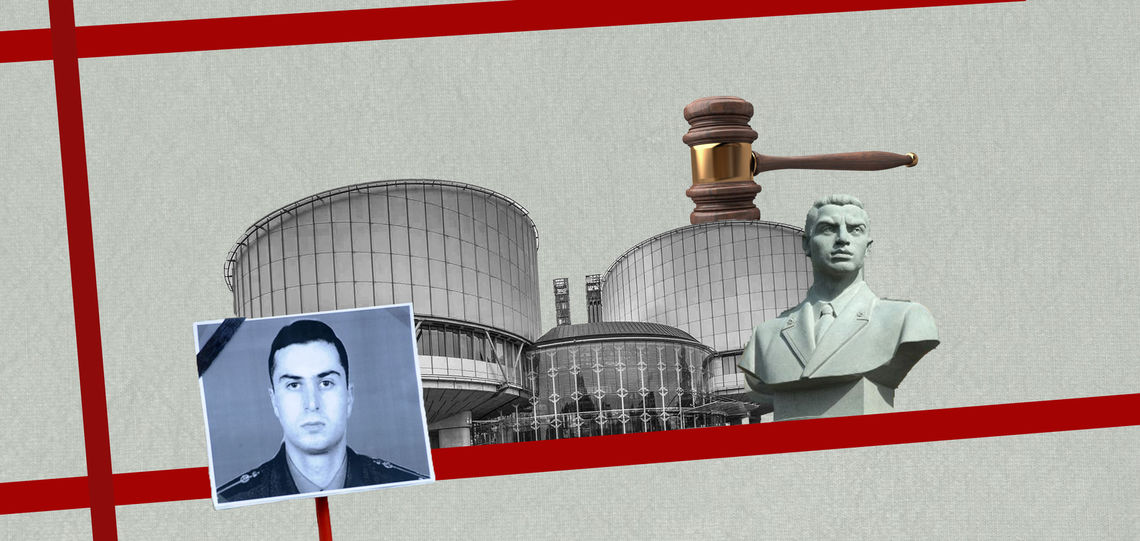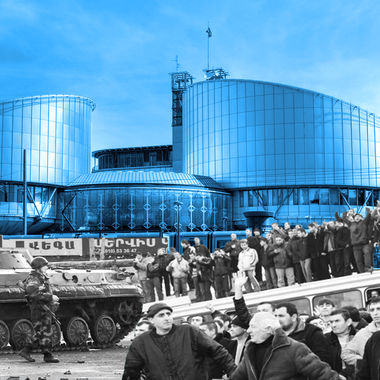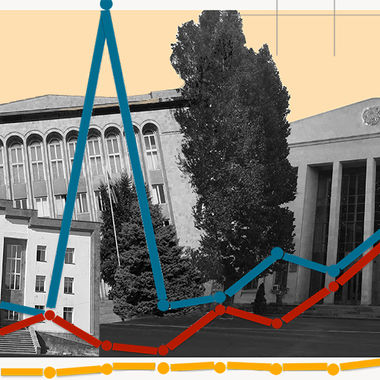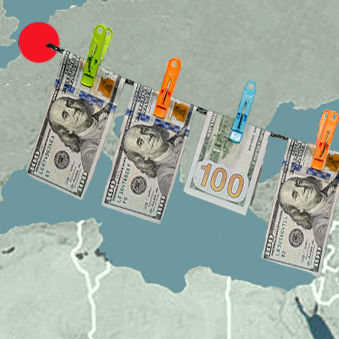Tue May 26 2020 · 15 min read
ECHR Chamber Judgment Holds Azerbaijan Accountable, But Falls Short
By Maria Titizian , Lusine Sargsyan

The European Court of Human Rights (ECHR) passed a Chamber judgment on May 26, 2020, in the case of Makuchyan and Minasyan v. Azerbaijan and Hungary.
The ECHR case concerned the 2004 murder of Armenian Lieutenant Gurgen Margaryan and attempted murder of another Armenian soldier, Hayk Makuchyan, by Azerbaijani Lieutenant Ramil Safarov during a NATO Partnership for Peace English language program in Budapest, Hungary. The ECHR case also involved the presidential pardon given to Safarov, who had been convicted to a life sentence by a court in Budapest, and the hero’s welcome he received after he was extradited to Azerbaijan from Hungary in 2012, where he was supposed to serve the rest of his sentence.
The Court unanimously found that there had been a procedural violation by Azerbaijan of Article 2 (right to life) of the European Convention on Human Rights and, by a vote of 6 to 1, of Article 14 (prohibition of discrimination) taken in conjunction with Article 2. The Court, however, also found, by a vote of 6 to 1, that there had been no substantive violation by Azerbaijan of Article 2 (right to life) and no procedural violation by Hungary of the same article. Also, the court unanimously found that neither the Azerbaijani nor Hungarian governments had failed to comply with Article 38 (obligation to furnish necessary facilities for the examination of the case).
The Court acknowledged that Azerbaijan endorsed Ramil Safarov’s acts by pardoning his conviction, bestowing a military promotion upon him, paying him a retroactive salary for the time he spent in prison in Hungary and giving him an apartment. Nevertheless, it found that international law could not hold the country of Azerbaijan responsible for the original crime. According to the Court, those acts were a private decision and had been “so flagrantly abusive and far removed from [Safarov’s] official status as a military officer” that the Court could not see how his commanding officers could have foreseen them or “how Azerbaijan could be responsible for them just because [Safarov] was a State agent.”
The Court did find, however, that there was no justification for the failure of the authorities in Azerbaijan to enforce Safarov’s punishment, thereby effectively granting him impunity for a serious hate crime.
According to the Court, the applicants (Makuchyan and Minasyan) had provided sufficient evidence to show that Safarov’s pardon and other measures in his favor had been ethnically motivated, including statements by high-ranking Azerbaijani officials expressing their support for his conduct and a specially dedicated page to Ramil Safarov on the President of Azerbaijan’s website.
Further Interpretation of the Judgment
This Chamber judgment can be interpreted as obliging Azerbaijan to implement the Hungarian court’s judgment and all diplomatic guarantees offered to the Hungarian government at the time of Safarov’s extradition. However, the ECHR’s judgment that there has been no violation by Azerbaijan of Article 2 of the Convention in its substantive limb is contestable. The Court was not convinced that Azerbaijan had “clearly and unequivocally acknowledged and adopted as its own Ramil Safarov’s deplorable acts” and that “there was no suggestion that he had committed the crimes on orders given by his superiors.” However, how does one explain that upon his extradition to Baku, Safarov was given a retroactive salary for the time he spent in prison in Hungary?
In his partly dissenting opinion, ECHR Judge Pinto de Albuquerque (Portugal) said that there had been a violation by Azerbaijan of Article 2 of the Convention in its substantive limb, as well as a violation by Hungary of Article 2 of the Convention in its procedural limb. In his opinion, he said: “In view of the extremely important and novel nature of the legal issues at stake in the present case and the high-profile nature of the facts, the pardoning of an ‘extremely cruel hate crime’ and of the people involved in them, namely the Prime Minister and Minister of Defence of Hungary and the President, Minister of Defence and Minister of Justice of Azerbaijan and considering that the case ‘raises questions of a general character affecting the observance of the Convention,’ I cannot but expect that this tragic case will be submitted to further reflection by the Grand Chamber. Hopefully one day full justice will be done to the applicants.”
The Original Case
The case against Azerbaijan and Hungary was lodged with the ECHR on February 25, 2013, by Hayk Makuchyan and Samvel Minasyan (who is now deceased; his widow and their two children are pursuing the case in his stead). Makuchyan (who Safarov also attempted to murder) was in Budapest with Gurgen Margaryan and is a member of the Armenian military. Minasyan is the uncle of Margaryan.
According to ECHR documents, the applicants alleged:
- Azerbaijan had been responsible for substantive and procedural violations of Article 2 (right to life) of the European Convention on Human Rights because the attack had been carried out by an Azerbaijani military officer and because he had been granted a pardon after his extradition, which prevented the full enforcement of his sentence;
- Hungary had also violated Article 2 of the Convention by granting and executing the request for the officer’s transfer “without obtaining adequate binding assurances from Baku that he would complete his prison sentence in Azerbaijan.”
- Under Article 14 (prohibition of discrimination) in conjunction with Article 2 that the attack had been an ethnically motivated hate crime, which the Azerbaijani Government had acknowledged and endorsed by granting the officer a presidential pardon and publicly venerating him.
- Both the Azerbaijani and Hungarian governments failed to disclose documents requested by them in the proceedings before the Strasbourg Court, in breach of Article 38 (obligation to furnish necessary facilities for examination of the case).
The applicants did not seek any damages, but “requested the Court to consider ordering appropriate measures in the case to achieve restitutio in integrum” (restoration of an injured party to the situation which would have prevailed had no injury been sustained), including measures that would ensure the re-opening of domestic proceedings and suggested this could include revoking the 2012 pardon.
Third-party comments were received from the Armenian government, which had exercised its right to intervene in the case.
Background: The Murder in Budapest
Lieutenant Gurgen Margaryan, along with Lieutenant Hayk Makuchyan, had traveled to Budapest Hungary in January 2004 to take part in a three-month English language course as part of NATO’s Partnership for Peace program. Azerbaijani Lieutenant Ramil Safarov was also participating in the program. A few weeks into the program, Margaryan was murdered in his sleep by Safarov. He was 26 years old.
Safarov, with the intent to kill the Armenian participants, entered Margaryan’s room at 5 a.m. on February 19, 2004, with an axe and, according to police reports, struck the sleeping Margaryan 16 times, nearly severing his head and stabbed him several times in the chest. Margaryan’s Hungarian roommate, Balázs Kuti, who was also asleep at the time, recounted what he saw when he woke up from the sounds: “By that time I understood that something terrible had happened because there was blood all around. I started to shout at the Azerbaijani urging him to stop it. He said that he had no problems with me and would not touch me, stabbed Gurgen a couple of more times and left. The expression of his face was as if he was glad he had finished something important. Greatly shocked, I ran out of the room to find help, and Ramil went in another direction.”
After killing Margaryan, Safarov attempted to target Makuchyan but did not succeed because his door was locked.
After being subdued by the other participants, Safarov was arrested by Hungarian police. Following his arrest, the Azerbaijani Foreign Ministry issued a statement claiming that Lieutenant Margaryan “repeatedly insulted the honor and dignity of the Azerbaijani officer and citizen,” which inevitably had provoked Safarov and influenced his emotional state. After a lengthy trial, Ramil Safarov was convicted of first degree murder in 2006 and sentenced to life imprisonment with no chance of parole for 30 years.
The Extradition
After serving eight years in prison in Budapest, the Hungarian Minister of Justice approved Safarov’s extradition to Azerbaijan in August 2012 (based on the 1983 Council of Europe Convention on the Transfer of Sentenced Prisoners), on condition that he will serve the rest of his sentence in prison in Azerbaijan. Viktor Orban, the Prime Minister of Hungary, defended his government’s decision at the time, saying that it stemmed from Hungarian and international laws. “We would have done the same if an Armenian had killed an Azerbaijani. Hungary should follow its own interests rather than those of Armenia or Azerbaijan,” Orban was quoted saying in the Hungarian Parliament.
The Hungarian Ministry of Justice and Public Administration also defended the extradition, saying they had received written guarantees from the government of Azerbaijan that Safarov will continue serving his life sentence in Azerbaijan and that the sentence will not be modified but will be immediately enforced. Instead, Safarov was pardoned immediately upon landing in Baku. A week after the extradition, in September 2012, thousands of Hungarians took the streets of Budapest to condemn their government’s decision to hand over Safarov to Azerbaijan.
The ECHR judgment mentions that, in September 2012, the Hungarian government expressed its disapproval of Safarov’s pardon by Azerbaijan but that they acted in accordance with international law. The judgement also said that, in its December 2012 report, the Hungarian Commissioner for Fundamental Rights noted that the Hungarian government should have requested assurances from the Azerbaijani government that Safarov would not be pardoned. The Commissioner said that the failure to do so endangered the rule of law.
The Hero’s Welcome
Upon his extradition to Azerbaijan, Safarov was welcomed as a hero and pardoned by the (still-serving) President of Azerbaijan, Ilham Aliyev, on the same day. He was also given a new apartment, promoted to the rank of Major, received backpay for the preceding eight years he served in prison and elevated as a national hero. Safarov’s pardon contradicted Azerbaijan’s criminal code, according to which prisoners serving a life sentence can only be freed after having served a minimum of 25 years.
The Armenian Reaction
Armenia strongly condemned Hungary’s decision and on August 31, 2012, by the decision of the National Security Council, Armenia suspended its diplomatic relations with Hungary. On the same day, then-President Serzh Sargsyan, convened an emergency meeting with the heads of diplomatic missions of the UN member states accredited in Armenia and heads of international organizations working in Armenia. “With their joint actions, Azerbaijan and Hungary opened the door for the recurrence of such crimes,” said Sargsyan during the meeting. Sargsyan went on to say that the decision sends a clear message to murderers that killings based on ethnic or religious hatred can go unpunished, which Armenia cannot tolerate.
Armenia’s Ministry of Foreign Affairs also issued a statement saying that the Armenian authorities had warned the government of Hungary on a number of occasions that Safarov’s act is glorified and justified in Azerbaijan, including by the country’s President. The statement noted that the numerous public statements by Azerbaijani officials should have been sufficient grounds for Hungary to doubt the continuation of Safarov’s sentence in Azerbaijan. The Ministry stressed that the government of Hungary should have foreseen the implications of its decision and therefore shares moral responsibility for sponsoring a grave criminal act.
Following the extradition of Safarov, a group of Armenians organized a protest action in front of the consulate of Hungary in Yerevan and pelted the building of the mission with tomatoes and eggs. Sargsyan said that the country was ready to fight, if necessary. “We don't want a war, but if we have to, we will fight and win. We are not afraid of killers, even if they enjoy the protection of the head of state.”
The Azerbaijani Laundromat and Connections to Budapest
In September 2017, the Organized Crime and Corruption Reporting Project (OCCRP) released a report saying that, between 2012 and 2014, the Azerbaijani ruling elite used a $2.9 billion secret slush fund to pay off European politicians, buy luxury goods and launder money in pursuit of the country’s political interests around the world. The report was titled “The Azerbaijani Laundromat” and revealed that Azerbaijan had channeled over 16,000 transactions through four shell companies registered in the United Kingdom.
According to the OCCRP report, between 2012 and 2013, over $9 million was transferred to the Hungarian bank accounts of Velasco International Inc., which belonged to the son of Azerbaijan’s First Deputy Prime Minister Yaqub Eyyubov. The company was dissolved in May 2015 and it is not clear where the money ended up. The report noted that the transfer of some part of the money coincided with the extradition of Ramil Safarov to Azerbaijan, who was serving a life sentence in Hungary. The report also mentioned that, a month before Safarov’s extradition, Hungarian PM Orban visited Baku in June 2012 and was greeted by Yaqub Eyyubov.
Back in September 2012, Armenia’s then-Foreign Affairs Minister Edward Nalbandian said that “corruption was at the root of the Azerbaijani-Hungarian deal on Safarov.” The OCCRP report came to support the suspicions that Azerbaijan paid for the extradition of an Azerbaijani convicted criminal.
Also read
Vahe Grigoryan on the Events of March 1, a Dysfunctional Judiciary and Transitional Justice
By Maria Titizian
Is it possible to restore and rehabilitate Armenia’s judiciary? Vahe Grigoryan talks about the significance of a landmark judgment by the ECHR relating to the events of March 1, 2008 when security forces cracked down on peaceful protesters during post-election demonstrations leaving ten people dead.
The Cost of Justice: ECtHR and Cases Against Armenia
By Lusine Sargsyan
Since joining the Council of Europe and ratifying the European Convention on Human Rights, Armenia’s government has been obligated to pay over 900,000 Euros as compensation to Armenian nationals.
An Inside View: The Azerbaijani Laundromat and Bribery in the Halls of Europe
By Bedo Demirdjian
After his many years working in Brussels and trying to counter the effects of Azerbaijan’s Caviar Diplomacy, Bedo Demirdjian writes about his anger and frustration at how many European politicians received money from Azerbaijani authorities in a scheme being dubbed the Azerbaijani Laundromat.
Further Explanations About the Court’s Decision
The following is taken from the Press Release issued by the ECHR:
Whether Azerbaijan was responsible for the murder of Gurgen Margaryan and attempted murder of Mr. Makuchyan under the substantive aspect of Article 2
The Court noted that the current standard under international law set a very high threshold for State responsibility for an act otherwise non-attributable to a State at the time it had been committed. In particular, to find a State responsible under international law it had to have “acknowledged” and “adopted” not just “approved” and “endorsed” the act.
The Azerbaijani Government actions as a whole, including the decision to pardon Ramil Safarov, promote him, award him salary arrears and grant him the use of a flat, had clearly and unequivocally demonstrated their “approval” and “endorsement” of his conduct.
Such endorsement was mirrored in statements submitted by the applicants that had been given by various Azerbaijani officials and other persons expressing personal approval of Ramil Safarov’s conduct, his transfer and/or pardon. The Court agreed that many of the statements in question, as well as a special section on the official webpage of the President of Azerbaijan with letters thanking the President for Ramil Safarov’s pardon, were particularly disturbing in that they glorified Ramil Safarov as a national hero for the gruesome crimes that he had committed.
However, the Court was not convinced that Azerbaijan had “clearly and unequivocally” “acknowledged” and “adopted” “as its own” Ramil Safarov’s deplorable acts, which had been part of a private decision. Furthermore, the attack had taken place at night, outside of training hours, and there was no suggestion that he had committed the crimes on orders given by his superiors.
The Court was not convinced either that such flagrantly abusive private acts, so far removed from Ramil Safarov’s official status as a military officer, could have been foreseen by his commanding officers or that the Azerbaijani State could be held responsible for them under international law just because he had been an agent of the State.
Nor was there anything in the case file to suggest that the procedure in Azerbaijan for the recruitment of members of the armed forces and the monitoring of their fitness to serve at the time that Ramil Safarov was sent on his mission to Hungary had been inadequate.
Stressing that its assessment was based on the very stringent standards set out by international law, the Court held that there had been no substantive violation of Article 2 by Azerbaijan.
Whether Azerbaijan had complied with its duty under the procedural aspect of Article 2 to ensure enforcement of Ramil Safarov’s punishment
The Court considered that Azerbaijan had assumed responsibility for the enforcement of Ramil Safarov’s prison sentence upon his transfer, and from that point on, it had been called upon to provide an adequate response to a very serious ethnically-biased crime for which one of its citizens had been convicted in another country. Given the extremely tense political situation between Azerbaijan and Armenia, the authorities should have been all the more cautious.
Instead of enforcing Ramil Safarov’s sentence, however, he had been set free and treated as an innocent or wrongfully convicted person and bestowed with benefits that had not apparently had any legal basis under domestic law.
Moreover, the Court was not convinced by the reasons submitted by the Azerbaijani Government for Ramil Safarov’’s immediate release. As concerned the alleged unfairness of the criminal proceedings, the Court found that Ramil Safarov had been tried in Hungary before courts at two levels, which had handed down well-reasoned decisions. In any event, if Ramil Safarov had considered his trial unfair, he could have, but had not, lodged an application with the European Court against Hungary once the criminal proceedings against him had come to an end.
As to Ramil Safarov’s personal history and mental difficulties, they could hardly justify the Azerbaijani authorities’ failure to enforce the punishment of one of their citizens for a serious hate crime. In any case, his mental capacities had been thoroughly assessed during his trial in Hungary by medical experts who found that he had been able to understand the consequences of his actions at the time. Indeed, the subsequent decision to promote Ramil Safarov would clearly suggest that the Azerbaijani authorities had deemed him fit to continue to serve in the military and that he had not therefore suffered from a serious mental condition.
Ramil Safarov had in effect been granted impunity in Azerbaijan for the crimes committed against his Armenian victims. That was not compatible with Azerbaijan’s obligation under Article 2 to effectively deter the commission of offences which put others’ lives at risk. The Court therefore held that there had been a procedural violation of Article 2 by Azerbaijan.
Whether Hungary had failed in its duty under Article 2 to ensure that Ramil Safarov would continue to serve his prison sentence even after he had left the country
First, the Court noted that the Hungarian authorities had followed to the letter the procedure set out in the Council of Europe Convention on the Transfer of Sentenced Persons when extraditing Ramil Safarov.
No tangible evidence had been brought before the Court to show that the Hungarian authorities had unequivocally been aware or should have been aware that Ramil Safarov would be released by Azerbaijan.
Indeed, given the time already served by Ramil Safarov in a Hungarian prison, the Court did not see how the authorities of that country could have done anything more than respect the procedure and the spirit of the Transfer Convention and trust that another Council of Europe State would act in good faith.
There had therefore been no procedural violation of Article 2 by Hungary.
Whether the Armenian ethnic origin of Ramil Safarov’s victims had played a role in the measures taken by the Azerbaijani authorities following his return
The Court noted that the Hungarian courts had found that the sole motive for Ramil Safarov’s acts had been the fact that his victims were Armenian. The ethnic bias of his crimes had thus been fully investigated by Hungary and the Court could see no reason to question the courts’ conclusions.
Furthermore, it was satisfied that the applicants had a sufficiently convincing prima facie case to show that the Azerbaijani measures in favour of Ramil Safarov had been racially motivated. In particular, he had been pardoned on his return, without any apparent formal request or any kind of reflection process or legal procedure. He had also been promoted and given various benefits, which, in the absence of any legal basis, had quite understandably been perceived as rewards for his conduct.
Moreover, it noted again the statements by Azerbaijani officials calling Ramil Safarov a patriot and a hero, as well as the special page dedicated to Ramil Safarov on the President of Azerbaijan’s website. It deplored the fact that the majority of those statements had expressed particular support for the fact that Ramil Safarov’s crimes had been directed against Armenian soldiers and considered that the very existence of the website suggested that he had been pardoned because of the ethnic nature of his attack.
Two statements provided by the Azerbaijani Government, on the other hand, denying that Ramil Safarov’s actions had been approved at an official level and that he had not been considered a hero in the country, were not sufficient to refute the overwhelming body of evidence from the applicants that the various measures leading to Ramil Safarov’s virtual impunity, coupled with the glorification of his extremely cruel hate crime, had had a causal link to the victims’ Armenian ethnicity.
The Government had failed to disprove the applicants’ arguable allegation of discrimination and there had been a violation of Article 14 in conjunction with Article 2 by Azerbaijan.
Whether the Azerbaijani and Hungarian Governments had failed to disclose documents
The applicants complained that both Governments had failed to disclose documents requested by them, referring in particular to Azerbaijan’s presidential order pardoning Ramil Safarov and the minutes of the meetings held by the president and the instructions issued by him relating to Ramil Safarov.
The Court found to the contrary that, at its request, both the Azerbaijani and Hungarian Governments had submitted the documents requested by the Court within the time-limit, including the presidential pardon decision. It was not aware of any further document which the Governments could have provided for a proper and effective examination of the applicants’ case, but had failed to do so.
In conclusion, neither of the respondent Governments had failed to cooperate with the Court and there had been no violation of Article 38.
Just satisfaction (Article 41)
The Court held, unanimously, that Azerbaijan was to pay the applicants, jointly, 15,143.33 pounds sterling (GBP) in respect of costs and expenses.






EVN Report welcomes comments that contribute to a healthy discussion and spur an informed debate. All comments will be moderated, thereby any post that includes hate speech, profanity or personal attacks will not be published.